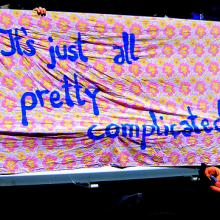Pro-choice

The Planned Parenthood logo is pictured outside a clinic in Boston, Massachusetts, on June 27, 2014. Photo via REUTERS / Dominick Reuter / RNS
Lawmakers are calling for investigations into a health care provider that has come under fire by anti-abortion activists for allegedly selling fetal organs for profit.
The anti-abortion group Center for Medical Progress claims that the Planned Parenthood foundation violated the law by selling the fetal tissue to medical researchers.
Planned Parenthood spokesman Eric Ferrero vehemently denied the accusations, saying that the tissue in question was donated to medical research – not sold.
“These outrageous claims are flat-out untrue, but that doesn’t matter to politicians with a longstanding political agenda to ban abortion and defund Planned Parenthood,” Ferrero said.
The number of abortions nationwide has declined by about 12 percent in the last 5 years, according to the Associated Press. States with the strongest restrictions to abortion access and states with the least show a similar decline in rates.
"Explanations vary," the Associated Press reports, with one factor being a decline in the teen pregnancy rate. Depending on which side of the abortion debate you lie, you can find advocates who attribute the overall decline in abortions to either better sex education and access to contracepton — or advanced technology and a new generation of women for whom there is "an increased awareness of the humanity of the baby before it is born."
From the AP:
"Abortion-rights advocates attribute it to expanded access to effective contraceptives and a drop in unintended pregnancies. Some foes of abortion say there has been a shift in societal attitudes, with more women choosing to carry their pregnancies to term.
Several of the states that have been most aggressive in passing anti-abortion laws — including Indiana, Missouri, Ohio, and Oklahoma — have seen their abortion numbers drop by more than 15 percent since 2010. But more liberal states such as New York, Washington and Oregon also had declines of that magnitude, even as they maintained unrestricted access to abortion."
Public Religion Research Institute, a public opinion research group in Washington, D.C., has created an interactive atlas of American values and hot-button social issues. See where your state lands on attitudes over the availability and legality of abortion here.
Despite Americans’ shifting opinions on a range of moral and ethical issues, abortion foes have been encouraged by numbers showing that opposition to abortion rights appeared to have resisted serious slippage, and was even gaining traction.
But a Gallup poll released May 29 shows that may be changing: 50 percent of all Americans now identify as “pro-choice,” the first statistically significant lead over the “pro-life” label, which came in at 44 percent, since 2008.
The data suggest this could signal an end to the seesaw battle that has characterized opinions on abortion over the past few years.
Even before rogue abortionist Kermit Gosnell was convicted in Philadelphia on Monday of delivering and then killing late-term infants, abortion opponents were convinced they had a case that could reshape an abortion debate that has remained static over the years.
After the verdict, they were even more confident.
“Dr. Gosnell is only the front man; and the real trial has only just begun. The defendant is the abortion license in America,” Robert P. George, a Princeton law professor and leading conservative activist, wrote after a jury convicted Gosnell of three counts of first-degree murder for snipping the spines of babies after botched abortions.
Gosnell, who could face the death penalty, was also found guilty of involuntary manslaughter in the death of a 41-year-old patient who sought an abortion at the squalid West Philadelphia clinic that prosecutors labeled a “house of horrors.”
Yet the fervent prayers for a game-changing impact from the Gosnell conviction may go unanswered for a variety of reasons.
WASHINGTON — Standing before the throngs at the March for Life on Jan. 25, Ryan Bomberger admitted that he was the poster child for one of the most difficult aspects of the abortion debate: his mother had been raped.
“I’m the fringe case that even pro-lifers have a hard time embracing,” said Bomberger, an anti-abortion activist whose mother chose to continue the pregnancy and put him up for adoption.
Forty years after the Roe v. Wade decision legalized abortion, children who were conceived through rape — and women who were raped and chose to end the pregnancy — are speaking out, opening a new front in the often-fraught discussions of a decades-old culture war.
This is a memorable week: on Monday the inauguration of President Obama on the holiday honoring Martin Luther King, Jr., and today, the 40th anniversary of the Roe v. Wade decision by the Supreme Court. Some people will celebrate all three with thanksgiving. Others will find nothing to celebrate – especially the decision of January 22, 1973 that struck down state laws banning abortion.
Another Inaugural Address
On Sunday, there will be another inaugural address – this one by Jesus at the beginning of his ministry (Luke 4: 14-21). After 40 days in the wilderness facing the devil, Jesus returned to his hometown of Nazareth and went to the synagogue. He took his place at the reading desk and someone handed him the scroll of Isaiah. The text says he “found the place where it was written.” Jesus read the text, handed the scroll back to the attendant and sat down. Everyone was looking at him – all those hometown folks who knew him as a child. Then Jesus said, “Today, this scripture has been fulfilled in your hearing.” That must have been a shock because the Isaiah text Jesus read proclaims more than anyone could see: good news to the poor, release to the captive, recovery of sight to the blind, freedom for the oppressed – and the year of the Lord’s favor. The hometown folks would have recognized the year of Jubilee when debts would be cancelled, slaves set free and the land allowed to rest. Jesus was making a very big claim!
How shall we interpret what Jesus said in light of our deep divisions over abortion? Is the fetus in the womb oppressed or is the pregnant woman denied choices oppressed? Is the woman captive to laws that restrict her access not only to abortion but to contraceptives? Or is the fetus a captive threatened with death? We have grown so accustomed to shouting slogans at one another that it has become almost impossible to have faithful conversations across our differences.
Four decades after Roe v. Wade, the landmark Supreme Court ruling that legalized abortion, many opponents of the decision are in a celebratory mood while those backing abortion rights are glum, feeling that momentum is turning decisively against them.
Yet in reality, little has changed in the fiercest and most protracted battle of the nation’s bitter culture war.
Instead, what’s really going on is a case study in the psychology of movement politics, where activists have to rally supporters with cries of alarm without making them despair that all is lost. At the same time, they must offer evidence that their efforts are paying off without leaving them complacent.
It’s a difficult balancing act, and lately the abortion rights camp has been the one to sound the warnings.
The influence of clergy in swaying their congregants' attitudes about moral issues like abortion and contraception access is dwindling, according to a new study.
The Religion, Values, and Experiences: Black and Hispanic American Attitudes on Abortion and Reproductive Issues survey, conducted by the Public Religion Research Institute, shows that there continues to be a disconnect in personal, moral belief and feelings about public policy.
"What they're hearing at church is not the big mover on attitudes of legality of abortion," Robert Jones, PRRI CEO, said.
While 51 percent of black Americans believe abortion is morally wrong, 67 percent say it should be legal in all or most cases.
"I really think that freedom of choice is probably one of the most precious components of what it means to be a Christian. Blacks have been quite possessive and reflective of this fact," said Dr. Stacy Floyd-Thomas, associate professor of Ethics and Society at Vanderbilt University's Divinity School. "… You do have the majority saying that they might see it as a sin or they are against it, but you still have the right."
Both groups believe it is possible to disagree with church teaching and be a good Catholic or good Christian. Jones pointed to the growing trend of personal versus external focus. Previous surveys have shown that attitudes about religion are mostly influenced by people's own beliefs and behaviors rather than institutional doctrine.

"It's Complicated." Photo by Jenny Poole via Wylio http://www.wylio.com/credits/Flickr/4752357353
A fascinating new study by the Public Religion Research Institute found that two-thirds of all Americans identify with both the "pro-life" and "pro-choice" labels simultaneously.
The PRRI reports that 7-in-10 Americans say the term “pro-choice” describes them "somewhat" or "very well," and nearly two-thirds simultaneously say the term “pro-life” describes them "somewhat" or "very well."
"This overlapping identity is present in virtually every demographic group," the report said.
In one of the largest public opinoin surveys ever conducted on the subject of abortion and religion, PRRI's study, "Millennials, Abortion and Religion Survey," uncovered "large generational differences on two issues that have often been linked in political discourse: abortion and same-sex marriage."
According to the survey, Americans ages 18-29 (a.k.a., "Millennials") strongly support legal access to abortion services in their local communities despite being conflicted about the morality of abortion itself.
Yesterday (Nov. 8), Mississippi voters defeated Ballot Measure 26, "the Personhood Amendment," which would have granted the status of legal person to a fertilized egg. The measure effectively would have outlawed abortion in all circumstances within the state, deeming it murder. It would have made the protection of the mother's life a criminal offense, if that protection risked the life of the fertilized egg.
There were lots of points of controversy over this measure. It was so extreme that even the Catholic Bishops denounced it. For me the most haunting question was this: "Who would it harm most?" My conclusion: families -- especially poor ones. When mothers -- especially poor ones -- die of complications in childbirth, families fold.
The Public Religion Research Institute recently released the results of their newest survey, "Committed to Availability, Conflicted About Morality," which shined new light on the complexity of opinions on abortion between different religious groups and age demographics. The study results were presented two weeks ago at the Brookings Institution in Washington, D.C.
The most intriguing age group in the study are Millenials, ages 18 to 29. In the introduction to the survey results, the authors claim that given Millenials' self-described characteristics of being "confident, self-expressive, liberal, upbeat, and open to change," they have a "peculiar profile" when it comes to their views on abortion. And this is especially "peculiar" when viewed alongside their strong support for gender equality and rights for gay and lesbian people. Millenials' complex, label-defying views of abortion make them "conflicted about morality," the report states. But are Millenials really, actually conflicted about morality?
Former President George W. Bush receives a pro-life award this weekend from Legatus, an organization of Catholic business professionals.






